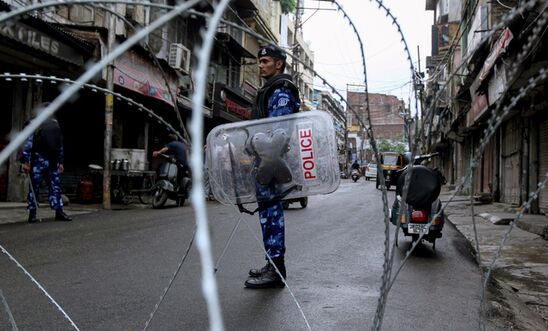
Press releases
India: Counter-terror raids on journalists and human rights organisations signal 'alarming' escalation in crackdown on dissent

Raids in Jammu and Kashmir conducted based on accusations that the organisations have been using funding from India and abroad ‘for secessionist and terrorist activities’
‘The authorities are evidently targeting these groups because of their continued work reporting and advocating for the rights of the people in the region, despite a harsh communications blackout imposed last year’ - Julie Verhaar
India’s government must immediately halt its intensifying suppression of dissent, said Amnesty International, following a series of counter-terrorism raids on the premises of human rights groups as well the homes of human rights defenders and journalists in Jammu and Kashmir.
The National Investigation Agency (NIA) raided the residences and offices of prominent human rights activist Khurram Parvez, the co-ordinator of Jammu Kashmir Coalition of Civil Society; three of his associates, as well as Parveena Ahanger, Chairperson of the Association of Parents of Disappeared Persons.
Both organisations have reported extensively on human rights abuses in Kashmir, including the indefinite detention and extrajudicial execution of human rights defenders, torture of people in detention and widespread impunity of the security forces in the region.
In September, the Association of Parents of Disappeared Persons submitted almost 40 testimonies of victims who were subjected to arbitrary detention and torture by security forces in Kashmir to the Working Group on Arbitrary Detention and the UN Special Rapporteur on Torture.
In August, the Jammu Kashmir Coalition of Civil Society published its bi-annual human rights review documenting the extrajudicial executions of at least 32 individuals and the impact of internet shutdowns in the region.
Further raids were carried out on the offices of NGOs Athrout and the GK Trust as well as on the home of Agence France-Presse’s Kashmir correspondent, Parvez Bukhari.
According to a statement released by the NIA, the raids were conducted based on “credible information” that the organisations have been using funding from India and abroad “for secessionist and terrorist activities" in Jammu and Kashmir, in contravention of Unlawful Activities Prevention Act (UAPA) and Foreign Contribution (Regulation) Act (FCRA). These accusations follow a pattern of using the UAPA to silence human rights groups across the country.
Julie Verhaar, Acting Secretary General of Amnesty, said:
“These raids are an alarming reminder that India’s government is determined to suppress all dissenting voices in Jammu and Kashmir. The authorities are evidently targeting these groups because of their continued work reporting and advocating for the rights of the people in the region, despite a harsh communications blackout imposed last year.
“In a worrying pattern, the Unlawful Activities Prevention Act and foreign funding laws are repeatedly and deliberately being weaponised to intimidate, harass and restrict the ability of human rights groups from operating, in clear violation of their rights to freedom of expression and association.”
India’s laws ‘punish human rights reporting’
The raids come after Amnesty India was forced to shut down operations earlier this month. The government froze the organisation’s bank accounts shortly after it released a “Situation Update” on human rights in Jammu and Kashmir.
Both the UAPA and FCRA have been criticised by UN human rights experts for their overarching nature, as well as how they can be abused to criminalise religious minorities, political dissidents and human rights defenders. In October 2020, the UN High Commissioner for Human Rights Michelle Bachelet appealed to India’s government to review the FCRA and its compliance with international law, and regretted that it was being “used to deter or punish NGOs for human rights reporting”.
Since 2014, several organisations have been targeted under the foreign funding law, including Greenpeace India, Lawyers Collective, Centre for Promotion of Social Concerns, Sabrang Trust, Navsarjan Trust, Act Now for Harmony and Democracy, NGO Hazards Centre, and Indian Social Action Forum. In September, against the backdrop of a pandemic, the FCRA was further amended, without any public consultation, to choke civil society in India.